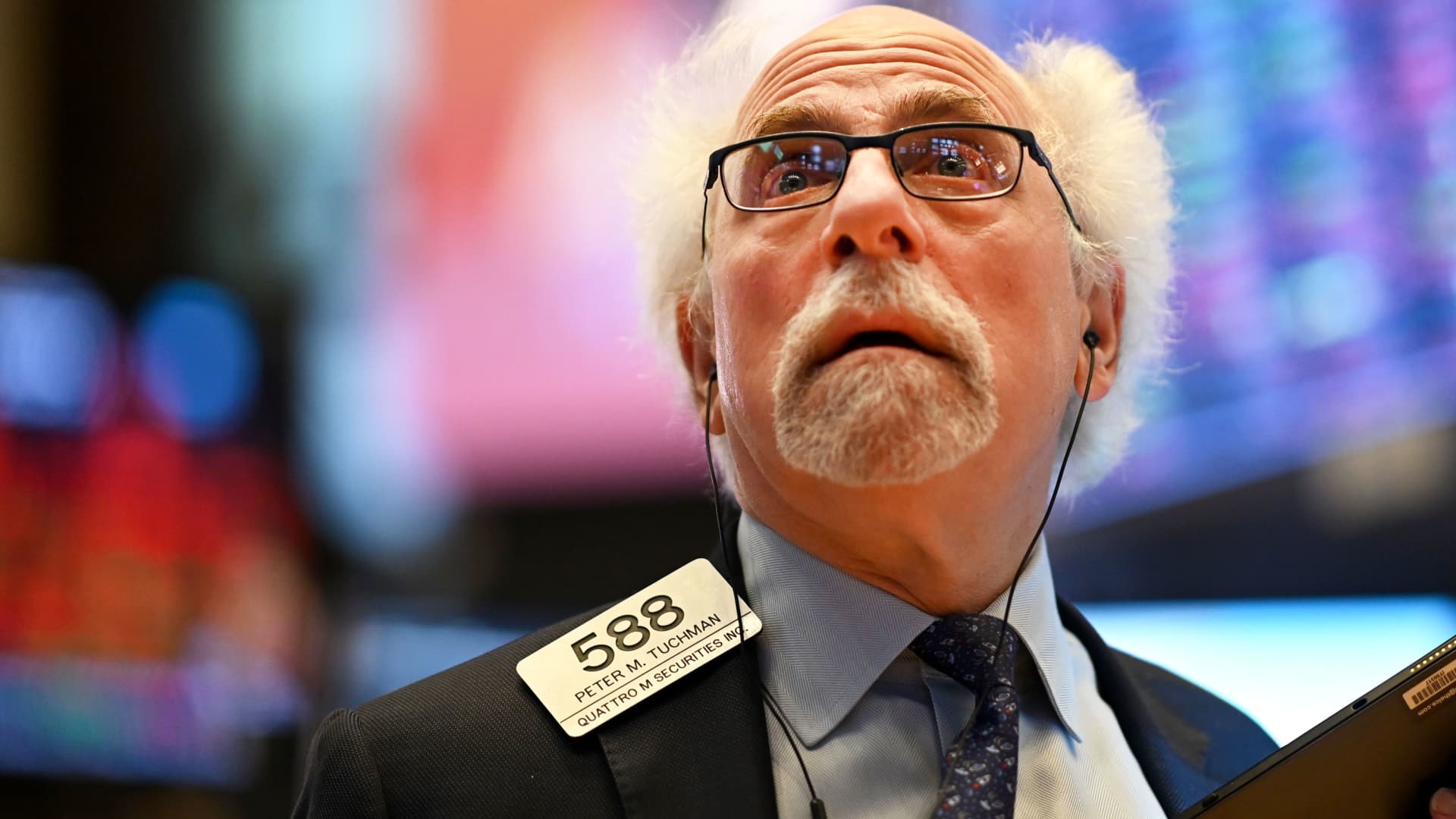Stocks fell sharply Thursday after the latest U.S. economic data showed a sharp slowdown in growth and pointed to persistent inflation.
The Dow Jones Industrial Average slid 689 points, or 1.8%, weighed down by sharp declines in Caterpillar and IBM. The S&P 500 dropped 1.2%, and the Nasdaq Composite lost 1.4%.
U.S. gross domestic product expanded 1.6% in the first quarter, the Bureau of Economic Analysis said. Economists polled by Dow Jones forecast GDP growth would come in at 2.4%.
Along with the downbeat growth rate for the quarter, the report showed consumer prices increased at a 3.4% pace, well above the previous quarter’s 1.8% advance. This raised concern over persistent inflation and put into question whether the Federal Reserve will be able to cut rates anytime soon.
“In the short term, the numbers don’t appear to be a green light for either bulls or bears…the uncertainty is unlikely to ease pressures in a market experiencing its deepest pullback since last year,” said Chris Larkin, managing director of trading and investing at E*Trade from Morgan Stanley.
Following the GDP print, traders moved down expectations for an easing of Federal Reserve monetary policy. Traders now forecast just one interest rate cut this year, according to the CME FedWatch Tool.
Tech tumble
The lackluster GDP added further pressure to an already-tense market contending with concerns over a pullback in growth among technology earnings.
Meta plunged 13% in premarket trading after the social media giant issued light revenue guidance for the second quarter. That would be the stock’s biggest one-day decline since October 2022. International Business Machines also fell 8% after missing consensus estimates for first-quarter revenue.
“For all of the attention given to generative AI in the past nine months, the failure of Meta to attain its revenue growth projections in Q1 is raising questions about whether the monetization of this technology is as easy as what traders were led to believe by management,” said Thierry Wizman, global FX and rates strategist at Macquarie.
Meta’s report raises concern ahead of other big tech releases. Microsoft and Alphabet are slated to post earnings after the close Thursday.
10:46 a.m.: IBM and Caterpillar lead Dow lower
The Dow has dived almost 700 points in early Thursday trading, putting the blue-chip average on track for its worst day this year.
IBM and Caterpillar led the 30-stock index into the red, dropping more than 9% and 7%, respectively, on the back of earnings. Both missed analyst estimates for revenue in the quarter.
Big technology names Microsoft and Amazon were the next worst performers, shedding nearly 4% and 3%, respectively.
More than two out of every three Dow stocks traded down in the session. Merck, which reported better-than-anticipated earnings this morning, and UnitedHealth bucked the downtrend, with each up more than 1% in the session
— Alex Harring
10:22 a.m.: Meta shares on pace for worst day since October 2022
Meta Platforms shares plummeted 11.34% on Thursday. The losses put the stock on pace for its worst day since October 27, 2022, when Meta declined 24.56%.
Shares fell after Meta issued weak revenue guidance that overshadowed its better-than-expected earnings in the first quarter. The sell-off intensified following CEO Mark Zuckerberg’s comments on the company’s long-term investments in artificial intelligence and the metaverse.

— Hakyung Kim
10:04 a.m.: New York Stock Exchange decliners lead advancers 10-1
About 10 stocks traded lower at the New York Stock Exchange on Thursday for every one advancer, as the latest GDP report and new tech earnings dampened investor sentiment. Overall, 2,386 NYSE-listed stocks fell, while 210 advanced.
— Fred Imbert
9:52 a.m.: The U.S. GDP report was the ‘worst of both worlds,’ investor says
A disappointing U.S. GDP print could spell trouble ahead for the equity market if inflation continues to prove sticky, one investor said.
“This report was the worst of both worlds: economic growth is slowing and inflationary pressures are persisting,” wrote Chris Zaccarelli, investment chief at Independent Advisor Alliance.
“The Fed wants to see inflation start coming down in a persistent manner, but the market wants to see economic growth and corporate profits increasing, so if neither are headed in the right direction then that’s going to be bad news for markets,” he continued.
The data also raises the stakes for the personal consumption expenditures report that is set to release Friday. Investors are hoping the PCE report, which is the Fed’s preferred measure of inflation, will show an improvement in pricing pressures after the March consumer inflation report came in hotter than expected.
— Sarah Min
9:33 a.m.: Stocks fall after GDP data shows slowing economic growth
Stocks opened lower on Thursday, with equities selling off after fresh gross domestic product data signaled signs of slowing economic growth.
The Dow Jones Industrial Average pulled back 500 points, or 1.3%. The S&P 500 pulled back 1.4%, while the Nasdaq Composite lost 2.3%.
— Brian Evans
8:58 a.m.: 10-year Treasury yield jumps to highest level since November
The 10-year Treasury yield broke above 4.7% following the GDP report, hitting its highest level since November.

While slowing economic growth could be a factor that pushes the Federal Reserve toward rate cuts, the rising prices shown in the GDP report could cause the central bank to hold rates steady until inflation recedes.
— Jesse Pound
8:51 a.m.: Gross domestic product slowed in the first quarter
U.S. gross domestic product slowed in the first quarter, the Bureau of Economic Analysis said Thursday, which weigh on stock futures before the opening bell.
GDP expanded 1.6% in the first quarter, while economists polled by Dow Jones forecast growth of 2.4%.
— Brian Evans
